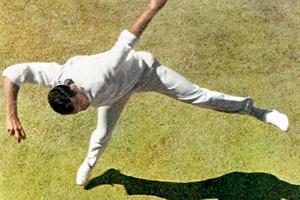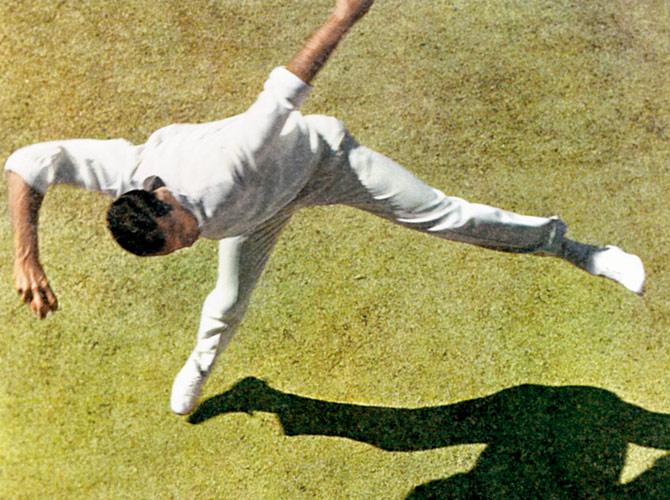International cricket bid goodbye to one of the game's finest fielders, who was spoken of in the same breath as Jonty Rhodes and vice versa


South African Colin Bland's athleticism is conveyed through this photograph. Pic courtesy: Pageant of Cricket by David Frith
ADVERTISEMENT
 Imagine a ground buzzing with excitement just to watch a fielder making the area surrounding the 22 yards his own stage. This was not unthinkable during the great days of South African Colin Bland - long before Jonty Rhodes appeared on the scene.
Imagine a ground buzzing with excitement just to watch a fielder making the area surrounding the 22 yards his own stage. This was not unthinkable during the great days of South African Colin Bland - long before Jonty Rhodes appeared on the scene.
Bland, 80, the best outfielder in the world during the 1960s, passed away in London recently, succumbing to colon cancer. He was known as the Golden Eagle, always ready to swoop down on anything at midwicket or cover. Like Rhodes, Bland also excelled in hockey. In fact, he played rugby too and was once offered a football scholarship at Stellenbosch University.
When Rhodes was at the peak of his powers, there were debates in South Africa as to which of the two fielding exponents was better. Since Graeme Pollock saw them both, I asked the Johannesburg-based golden great for his opinion. Pollock offered a straight bat. "Colin was probably the greatest fielder of all time. He played at a time when there was no one-day international cricket and he would have been unbelievable," he told me. Pollock had the good fortune of meeting his teammate at Lord's in London last year. Bland seemed to be doing well on the health front then only to discover that things changed for the worse this year. "Colin was a brilliant fielder, but we must not forget his batting - three centuries at Sydney [1964], Johannesburg [1964] and at the Oval [1965], besides some vital half centuries - to end up with a Test average of 49.08."
Bland's finest hour as a fielder was at Lord's in 1965. England's star Ken Barrington was batting on 91. He set out for a single off an over-pitched delivery from medium pacer James Botten. The ball went between midwicket and mid-on. The next thing Barrington saw was Bland running for the ball and throwing it to destroy the stumps with Barrington out of the crease. In Playing it Straight, Barrington reflected: "Even my disappointment at missing a hundred at headquarters was tempered by my admiration for Bland's brilliance. People said, 'Why did you run? You knew Bland was good.' I had to reply honestly, 'Yes, but I didn't realise he was as good as that.'"
Bland also ran out Jim Parks and England's Colin Cowdrey described it vividly in his book, MCC: "Bland drew back his arm like an Olympic javelin thrower and hurled the ball under Parks' feet as he ran. Parks was still out of his ground when his middle stump went cartwheeling into the air. It was the most breathtaking piece of fielding I have ever seen."
Cowdrey revealed that the England camp decided against quick singles when Bland was around. The genial Englishman later invited Bland to exhibit his fielding skills when the South Africans came to play against Kent at Canterbury where 2,000 Bland fans gave him a "spontaneous ovation" according to Cowdrey.
Never known to drop a chance in the outfield, Bland was once stationed at short leg against Australia at Melbourne in 1964. Opener Ian Redpath offered a chance to Bland in his unfamiliar position and the catch was spilled with Redpath going on to score 97. Bland's teammates, including Pollock, were stunned. How could the best fielder in the world misjudge a catch, they wondered. Pollock had no doubts that from then on, close-in catches were added to Bland's extensive practice sessions. That was Bland's last dropped catch in Test cricket.
In his 21st Test, Bland injured his knee as he crashed into a railing at Johannesburg, trying to save a boundary against Australia. The injury brought the curtain down on a fine Test career. For Mike Procter, who came in as substitute for Bland, the joy of holding on to two catches as the Australians crashed to defeat, was dashed by Bland's injury.
Pollock stressed that Bland was a great team man, too. And Ali Bacher, the celebrated former SA captain, also remembered Bland for his good nature. Rookie Bacher kicked off the 1965 tour of England with only 10 runs to show against Derbyshire. He believed he had messed up his chances to get into the Test side. On the bus back to the hotel after the game, as Bacher was anxious about his future, Bland took a seat beside the young batsman and assured him, "Don't worry, Ali, the runs will come." In less than a week, Bacher and Bland shared a 148-run stand for the fifth wicket against Essex and both made a good impression in the opening Test at Lord's.
Bland's heroics and training methods couldn't be well-documented in pre-live television days. Cowdrey rued that the fielding masterclass at Canterbury in 1965 was not captured on camera for kids to learn from. Barry Richards, another great South African, did not forget to bring up Bland in his 1973 instructional book. He told his young readers: "His [Bland's] throwing practises, where he could time and again knock out one stump from 20 yards, became legendary. His dedication should be an inspiration to you." Bland is gone, but his stage is untouched.
mid-day's group sports editor Clayton Murzello is a purist with an open stance. He tweets @ClaytonMurzello Send your feedback to mailbag@mid-day.com
Catch up on all the latest Mumbai news, crime news, current affairs, and also a complete guide on Mumbai from food to things to do and events across the city here. Also download the new mid-day Android and iOS apps to get latest updates
 Subscribe today by clicking the link and stay updated with the latest news!" Click here!
Subscribe today by clicking the link and stay updated with the latest news!" Click here!






